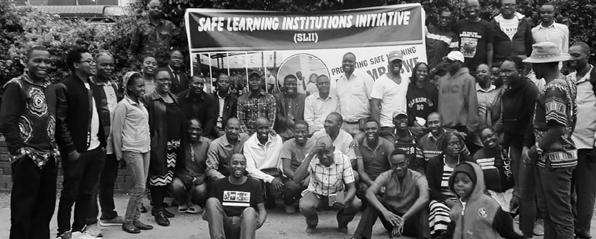
3 minute read
THE FUTURE OF HIGHER EDUCATION: SHOULD WE BE WORRIED?
- BY RURAMAI ERASMAS MUTIMUSAKWA
Historically, the quality of education in Zimbabwe has been at some point recognised internationally. Over the years, it started flagging and everyone acts as if it is still the same recognised education. If a survey was to be done, one will be tempted to say that those who studied under the Smith government were better equipped than any student who entered tertiary education in the late 2000s. The Smith education system was integrated within the social, political and economic aspects of the entire country. Education curriculum frameworks were crafted with all those aspects in mind, now it is as if no one cares.
Advertisement
To begin with, the educational system of the Smith government guaranteed students of every level to be employable in line with their levels of education. Tertiary students particularly from university were commonly associated with managerial positions whilst those in polytechnics were the actual employees, supervised by the university students. That is to say polytechnic students knew how to do the actual jobs and university students were the supervisors.
After independence, the problem that we had was that the government took a drive to build more universities as opposed to polytechnics thereby creating the skills overload and the unemployment problem that is yet to haunt us if it goes unsolved. As of today, we have more universities than we do polytechnics, which one can say we now have more managers than actual employees. If we are to look at the business fraternity in Zimbabwe, industries are nonfunctional (regardless of them being open) and yet every year universities produce over one hundred thousand possible managers with only a few employees.

If we consider the technological and digital advancements that take place, our higher education institutions are still far from catching on. In a world of crypto currencies and digital payment platforms, our institutions still teach the same accounting and finance skills that were taught in the 1960s.
As a result, if we try to visualize and imagine the future of higher education we might wonder whether tertiary education is still worth it and carries the same weight it did 40 years ago. Most entrepreneurs openly say - you do not need higher education to be successful. In Zimbabwe almost everyone who is employed is probably over qualified and as this persists, higher education is likely to lose relevance. The only thing that is constantly changing in our institutions are the modes of payments and fees structures. Thus, higher education in Zimbabwe to be specific is now just a series of business transactions. What hurts the most is that these issues can be addressed but there will always be that one person who does not realize that something is broken until it is too late.
The striking example - the pilot schools or training institutions in the country have not stopped enrolling new aspiring pilots, and yet every year they continue to chuck out more and more graduates. This case really raises eyebrows, because the question is: which planes are these pilots looking to fly considering that a whole country only has one available plane? Let’s remember that this is the same plane that has been blacklisted to land in Europe because of the safety issues. Not to drag you into the socalled Africa-West feuds, but the fact is that people out there are even scared that the one plane we have as a country has the risk of blowing up.
A recent paper titled “15 degrees Celsius” as well as a TED talk of the same name revealed the most shocking yet debatable topic. The paper stated that most if not all countries that only experienced temperatures above 15 degrees excluding America have never invented anything, whilst countries that have experienced temperatures mostly below 15 degrees Celsius have invented everything that we use today. The reasons being countries that experienced low temperatures had to work extra hard to innovate when it came to heating their houses, changing their car systems, energy systems amongst others and today our education still has a lot to be desired.
It is highly important for our generation to not only understand that education is essential, but to act in line with this understanding, otherwise we will have been slowly but surely sentencing ourselves to death. If not for us then for those that come after us.
Ruramai is a 25-year-old young man working in the Civic Society sector with over 2 years of experience. He acts as a voice amongst young people in African Societies. Passionate about sports and young people’s participation. Currently the Information and Communications Officer for the Student Christian Movement of Zimbabwe, an affiliate of the World Students Christian Federation WSCF.








